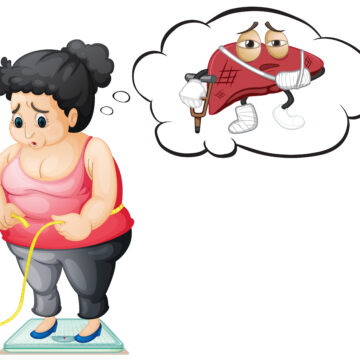
- Jaundice, itching, and an excessively bloated belly may be a sign of liver disease.
- Obesity may lead to non-alcoholic fatty liver disease.
- Heavy drinking can take a toll on the liver and lead to liver cirrhosis.
If you experience any (or all) of these signs, it might be time to visit your doctor.
1. Yellowish eyes and skin

“Yellow eyes are the most obvious sign of liver disease, says Dr. KV Narayanan Menon, Cleveland Clinic’sClinic’s medical director of liver transplantation. The liver breaks down a yellow colored substance called bilirubin to eliminate it from the body. However, when there’s liver trouble, bilirubin can build up and lead to jaundice or the yellowing of the skin and the whites of the eyes.
2. Bloated belly

Excessive bloating can indicate fluid buildup in the abdomen, which is caused by increased pressure within the liver’s blood vessels, says Dr. Menon.
3. Hepatitis A, B, or C

Viral or parasitic infections in the liver can cause inflammation and poor liver function. Hepatitis viruses are the most common types of liver infection. Hepatitis A spreads through a contaminated person’s feces or consuming infected food and drink, while hepatitis B and C are transmitted through bodily fluids like blood, saliva, and during sex. Hepatitis A infections heal on their own, but hepatitis B and C are chronic types.
4. Itching

A problematic liver can cause your whole body to itch. Dr. Menon says it might be related to bile salt. The liver produces bile, a digestive substance. However, bile can accumulate cause itching in people with primary biliary cirrhosis.
5. Persistent fatigue

Feeling tired all the time is sometimes a sign of an underlying health condition. It can have many causes, and one of them is liver disease. According to a 2018 study published in the Liver International journal, fatigue caused by liver disease is linked to depression and anxiety.
6. Chronic alcohol use

The liver eliminates chemicals and toxins from your body, so chronic heavy drinking mean it’s working overtime, which can lead to liver disease.
7. Confusion or forgetfulness

If you get easily confused or misplace almost everything and have already been diagnosed with advanced liver disease, it can be hepatic encephalopathy. This rare condition can occur when the liver can’t properly remove toxins from the body. According to the American Liver Foundation, it usually affects patients with chronic liver disease, cirrhosis, or hepatitis. See a doctor immediately if you experience these symptoms.
8. Being overweight

Non-alcoholic fatty liver disease is a condition where fat has built up within the liver. According to the Lover Foundation, the disease is on the rise and is common among people in their 40s and 50s. Non-alcoholic fatty liver disease can sometimes lead to cirrhosis or scarring of the liver. Obesity, high cholesterol, and type 2 diabetes are risk factors for non-alcoholic fatty liver disease.
9. Having a family history of liver disease

A few types of liver diseases are hereditary. If you have family members who died of liver disease, including liver cancer, talk about it with your doctor, says Dr. Menon.
Source: The Healthy
